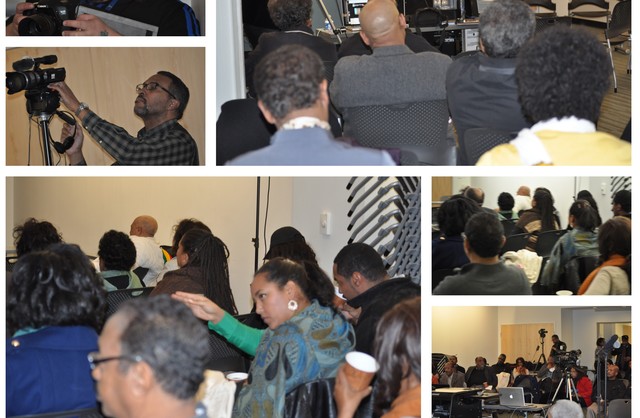 The second community forum on mental health took place on Saturday, December 15th, 2012 at the Shaw Neighborhood Library in D.C. (Image credit: Filmstock Inc)
The second community forum on mental health took place on Saturday, December 15th, 2012 at the Shaw Neighborhood Library in D.C. (Image credit: Filmstock Inc)
Tadias Magazine
By Tsedey Aragie
Updated: Friday, December 21, 2012
Washington, DC (TADIAS) – Last week I hosted the second public forum on mental health here in Washington, D.C. The interactive get-together attracted over 100 participants from across the country who joined the conversation via conference call as well as an online live stream channel in addition to those who attended in person at the Shaw Neighborhood Library.
I am happy to report that it was another fruitful and educational event. My only regret is that we ran out of time before we could cover all the speakers because we did not assign and monitor time segments properly, which we will fix next time.
One of the key point that was repeatedly emphasized at the meeting was the need to incorporate religious leaders in this dialogue as well as in the treatment and healing process for individuals. There are studies that show that the close knit and communal nature of our culture does play a protective role in preventing mental illness.
As tax payers we do have the right to vocalize the importance of including natural remedies to be recognized as part of the treatment plan by lobbying the appropriate government agencies that write the policies governing health service providers.
It was also noted that there is an abundance of health professionals among the Ethiopian & Eritrean populations in the Washington D.C. metropolitan area, but that talent pool is under-utilized. Often medical professionals are at the forefront of this fight and if given the proper training could recognize any ongoing mental health issues as they are developing, most importantly as it relates to substance abuse and addiction.
We also learned that the World Health Organization has partnered with the Ethiopian Ministry of Health to implement a Mental Health program in Ethiopia that could also be used as a resource.
The impact of Post Traumatic Syndrome Disorder (PTSD), which is commonly found among war veterans in this country, is another mental health problem that affects immigrants who have witnessed violence in close proximity, and how detrimental these effects are on a person’s psychological well-being, especially for those who have experienced violence in the Horn of Africa. Another issue raised was the impact of political oppression and how it affects an individual’s psychological makeup.
We also received an update from the working-team that was tasked to conduct research. The advocacy-group is led by the organization “My Love in Action” and they are to come up with a needs assessment survey, and create outreach programs geared towards collaborating with organizations that work with professionals in the behavioral science fields, including educational institutions, as well as student associations. They are making progress but they need your help so please get involved.
Sadly, our event took place the day following the mass shooting in Newtown, Connecticut where a 20-year-old gunman shot and killed 26 people – mostly children – at Sandy Hook Elementary School before committing suicide himself. Our thoughts and prayers remain with the victims’ families.
Below is a short video featuring clips from the “Second Community Forum on Mental Health” held on Saturday December 15th. I will keep you posted on future gatherings. In the meantime, you can follow updates on twitter @MyLoveInAction.
Watch: Clips from the “Second Community Forum on Mental Health” held on December 15th
—
Related:
Community Forum II on Mental Health Announcement
Interview With Dr. Welansa Asrat About Mental Health Taboo in the Ethiopian Community
—
Join the conversation on Twitter and Facebook.


























